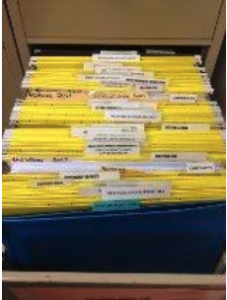The Public File – A Good or Bad Thing?

[March 2015] Among the most often violated rules, according to citations issued by the FCC, are those related to the Public Information File. Even so, Station Owner Michael Dudding thinks it has its place – and that place is not on the Internet.
What is wrong with this picture?

Actually, that was sort of a trick question. There is absolutely nothing wrong here. What you see is a typical “Public Information File” as found in virtually every broadcast station, nationwide.
Pasted on the front of each file folder, we have a summary of what is required in each file as per the FCC Rules and Regulations, specifically Section 73.3626 and 73.3527. Among the nearly 4.000 words (for the commercial stations, the non-commercial station requirements are a bit less), there is spelled out what needs to be in the Public Inspection File.
Simply put, the Public Inspection File contains information about the station ownership and operation. Some are pretty straightforward: one file contains your coverage contour, another, the FCC publication “The Public and Broadcasting.” Some of the Public File requirements are highly detailed, like how the station has met the EEO rules, complete with its own rule section (73.2080).
Most, though, take a modest amount of time to keep current, but do need regular attention.
Does It Have a Place?
One might view the Public Inspection File as a nuisance.
However, if you take a step back and consider, it can be a great tool for radio owner/operators to have and use to be in compliance with the FCC Rules and Regulations.
Combined with rest of the items in the FCC Self-Inspection Checklists, the contents of the Public Inspection File can give a clear view of how the station is being operated. Indeed, they form the basis for both the FCC and the Alternative Broadcast Inspection Program (ABIP) inspections.
Another way to look at it: Any station can do a self-inspection at any time and, if done honestly, be able to rest assured they will not have any problems with the Enforcement Bureau.
On the Other Hand
After all this work, how often is the Public Inspection File really accessed? For most stations, the answer is “not very.”
In fact, in my 43 years of broadcasting, only once, just one time, (1!), has anyone from the general public looked at a specific file. And that is because I told them they could find the information they were looking for by checking in our Public Inspection File.
I am not alone. I used to belong to a group of small market radio broadcasters and the Public Inspection File was occasionally a topic of discussion. Yet, I cannot remember if any station owners had indicated anyone from the public sector had asked for a document from their Public Inspection File.
Checking with larger market folks, it seems that aside from FCC inspectors, the Public Inspection File seems to be accessed mostly by political operatives seeking information on other candidates and their advertising or activist groups looking for errors to report to the FCC.
What Really is Wrong
But here is what really is wrong: There is a plan in the works at The Federal Communications Commission (and US Government?) to have these files from licensed radio station posted online on the FCC website.
One thing is for sure: it certainly is going to take up a lot of time and effort on the part of stations, as well as a lot of bandwidth space on the Internet. (Existing Public Inspection File posting requirements for TV stations posted on the web have already resulted in problems with the FCC servers.)
There seems to be little logical reason for this. As noted, aside from one or two specific groups, there is little public interest in the Public Inspection Files. And the only other use that comes to mind would be an automated way for the Enforcement Bureau to check and assess fines for stations that miss an on-line posting deadline for something by a day or two.
The FCC can, and should, do better for the stations it regulates.
– – –
Michael Dudding is the owner of KDSN, Denison, IA, a member of the Iowa Broadcast Association, and an active broadcaster for 30 years. Email Michael at: mdudding1@hotmail.com
